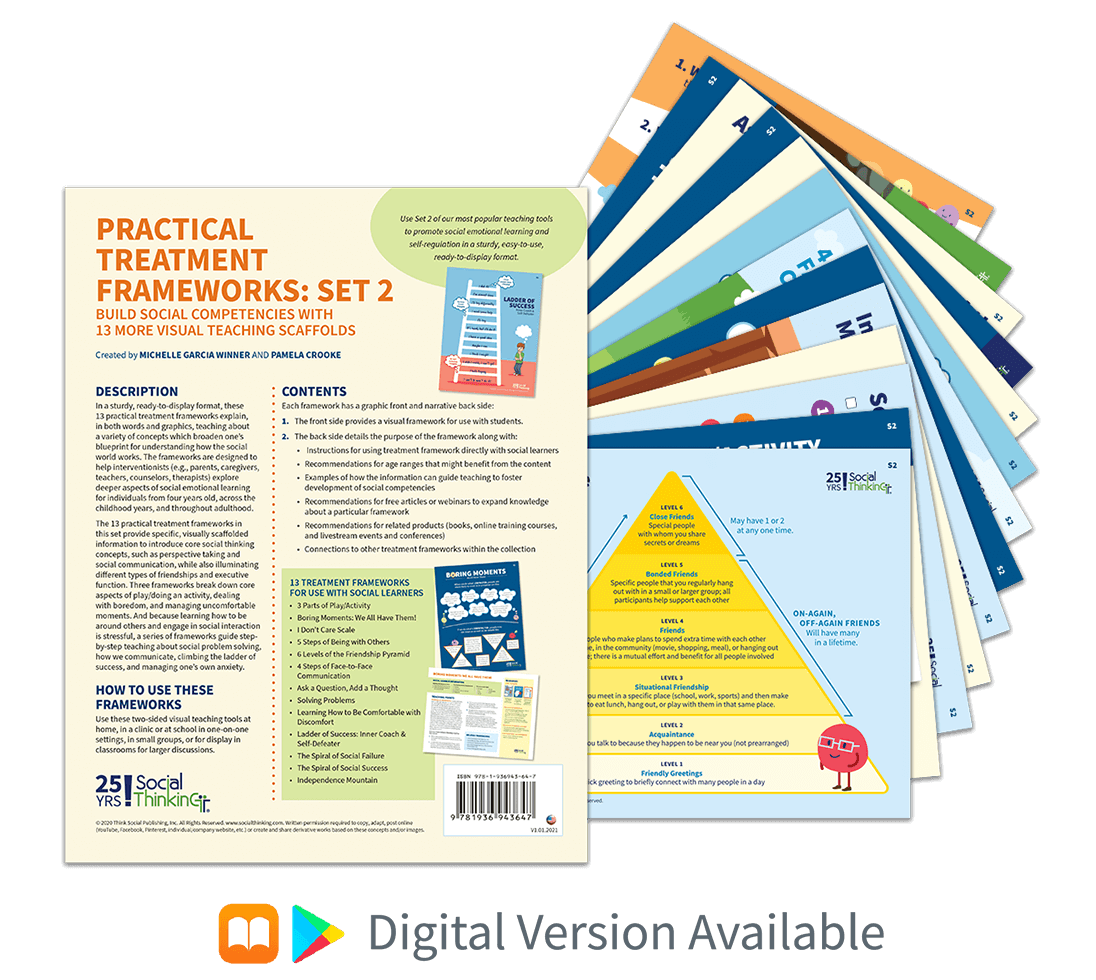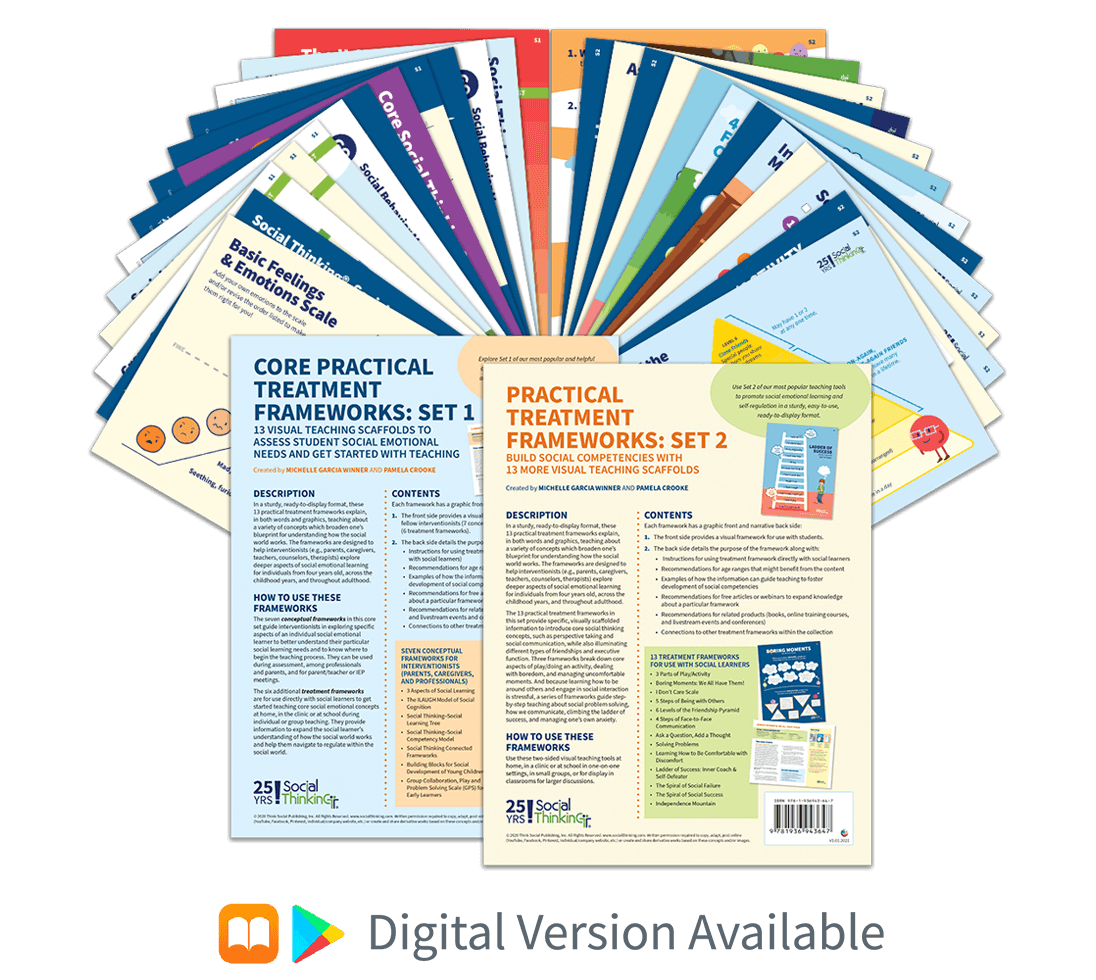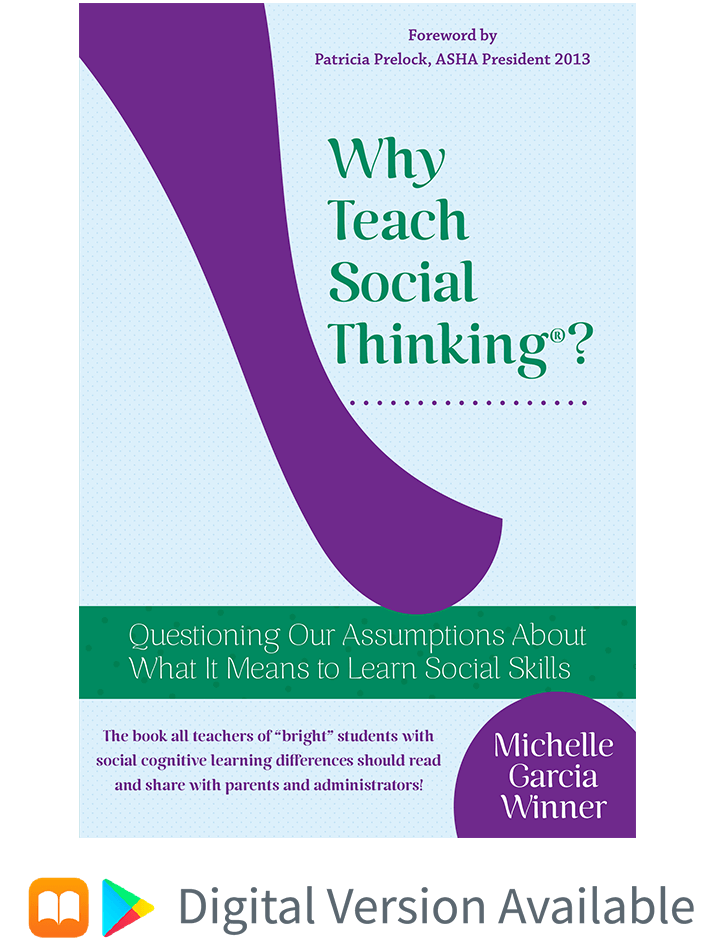© 2021 Think Social Publishing, Inc.
Social Thinking® was first created to help high school students learn about the complexities of the social mind and how these thinking processes relate to social skills, social academic tasks, and personal problem solving. As the years passed Michelle found herself helping many of her students transition into adulthood. As students transition into adulthood they have so much to learn that is nonacademic in nature but essential to developing a sense of independence and internal confidence in their abilities.
Part of the work we do is encouraging honest discussions during the middle and high school years to help teams create meaningful and realistic transition plans. We also encourage students graduating from high school to consider their strengths and weaknesses to help them decide what path will lead them to the most success. In reality the adult world is less concerned with a student’s diagnostic label or that a student had an IEP during the school years. It is more concerned with putting time and attention into college and career pathways with students who can think and do for themselves.
We have marked opinions about the challenges our students face after high school. This is especially true for individuals who have received strong special education supports and are now expected to journey into an adult world that offers very limited supports and where co-workers, bosses, and teachers are far less familiar with their social learning disability and social challenges in general.
For this reason Social Thinking, as a company, has made a commitment to developing teaching and treatment materials for older students, young adults and for persons living as adults. Many free articles on transition issues are available at the Social Thinking website, alongside books geared to these individuals. On the clinic side, Michelle and her team regularly work with young adults and adults into their 50s and 60s who are dealing with social challenges.
We don’t approach transition through rose-colored glasses. Our goal is to help teenagers evolve into young adults with their mental health intact along with the ability and desire to continue their learning.
How much can an adult client really learn?
Even though scientists tell us the brain physically stops growing by our mid-20s, has your brain stopped learning? We continue to learn throughout our lifetime and our social learning is no exception. We find that adult clients can be strong social learners. They have more social awareness and socially-based experiences, and they do well discussing and applying social concepts in real world settings. They are also less likely to blame their challenges on a peer, a teacher, or a parent.
We work with a range of adult clients, from individuals who struggle to develop vocational and community skills to senior executives at well-known companies you’d recognize.
It’s interesting to note that adults are taught skills (and encouraged to keep learning) to help them do better or advance in their vocation or career. However, the general public doesn’t take this same approach to social skills. If a person needs help with their social skills they are usually sent to a “counselor” or told they need to figure out “how to behave.”
While counselors, social workers, therapists, psychologists and psychiatrists can help people sort out their feelings and frustrations and guide them toward different types of treatments that may be available, few professionals in any of the mental health professions have received deep training in the social learning process. Therefore, mental health professionals may assume a client’s capacity to understand and self-analyze social shortcomings is resident and fully functioning. The professional may not connect the dots that a client’s anxiety stems from lifelong challenges with initiating communication or figuring out how to maintain a conversation of interest to other people. Furthermore, this absence of general training about persons with social learning weaknesses may well result in limited or inappropriate treatment options being presented to the client.
Through our own clinical experiences we have found that our adult clients continue to engage in a powerful social learning process throughout their lives. In fact, we all do! Have you noticed that you’re probably able to cope with difficult situations better today than you were able to 10 years ago?
The Social Thinking framework and its many concepts, strategies, and materials can be helpful for folks who consistently struggle with relationships across different aspects of their life (family, community and/or vocational). While we use the same core information to explore the social mind and related social skills as we do with our younger clients, we take the core concepts “up a notch” to a level of sophistication that matches the needs of the adult with whom we’re working.
How is Social Thinking used by HR Departments and Businesses?
It’s a well-stated and often quoted fact that we “hire people for their skills and we fire people for their behaviors.”
As a general rule people are much more comfortable helping another person learn technical skills (e.g. how to do a specific job or task) than they are offering some guidance when a co-worker seems to struggle with social skills or lacks good social sense. When employees find it difficult to create and/or maintain healthy relationships within the workplace or with clients, they are often admonished, written up, or told to “figure it out” or “go see a counselor.” None of us truly feel comfortable having a conversation about our social selves and the behaviors we demonstrate that make others feel uneasy in our presence. CEOs, managers, and department heads all shy away from the task because it’s just not something most people feel equipped to handle.
What business owners and HR departments often don’t realize is that at the heart of the social skills problem may be a social cognitive and/or social emotional disconnect. This can arise from a variety of sources including a lack of social insight or an inability to process and respond to so much social information so rapidly.
Michelle Garcia Winner and Pamela Crooke have a passion for working with adults and helping them change their lives for the better! Together, they wrote a book for all adults with more subtle social challenges, Social Thinking at Work: Strategies for Understanding and Navigating the Workplace. The very real and very honest content in the book guides adults to better understand core social concepts as well as consider the thoughts and feelings of the people they interact with in the workplace. It also impresses upon readers the various emotional undercurrents and related social skills expectations, the “unwritten rules”, that exist in every workplace and affect how people work and relate individually and as part of a team. HR staff find the book equally useful; it is filled with practical strategies and interesting frameworks that facilitate conversation about social behavior in specific social situations. Our clients frequently tell us they wish co-workers and managers would be more explicit about their social expectations. Social Thinking at Work: Strategies for Understanding and Navigating the Workplace addresses that concern.
Helping HR departments or HR companies access effective tools their employees can use to help them better understand social learning is a good start. Another option is having HR staff work with professionals trained in Social Thinking concepts and strategies to address general or specific needs of a group. Social Thinking therapists can also help hone the social skills of many “bright” employees who are ineffective, if not destructive, in relating to co-workers or clients.
It’s easy to assume that once we reach adulthood, our social learning has grown and matured to the point that we can figure out how to adapt our behaviors within any social situation we find ourselves. The simple truth is that most of us continue to make minor and sometimes major social blunders throughout our lives. Some of us are more aware of these mistakes than others, some of us know how to, or will figure out how to, repair a situation, while many of us don’t even recognize the error, let alone know how to fix it. Social Thinking, as a framework and a company, focuses on providing adults with the concrete teachings and strategies they need to become more aware of their social abilities and learn to become stronger social problem solvers, both in and outside the workplace.
















